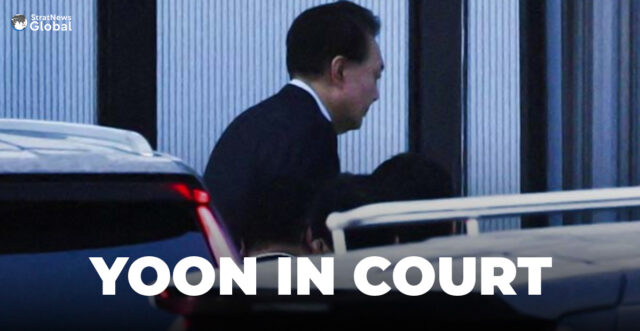South Korea’s impeached President Yoon Suk Yeol attended a court hearing on Saturday to challenge investigators’ request for an extension of his detention on insurrection charges, his lawyer said.
Yoon on Wednesday became the country’s first sitting president to be arrested, in a criminal probe related to his short-lived declaration of martial law on Dec. 3.
20-Day Custody Plea
South Korea’s investigators requested a detention warrant on Friday to extend their custody of Yoon for up to 20 days. He has been refusing to talk to investigators and has been held in the Seoul Detention Centre since his arrest.
Police were seen breaking up a crowd of Yoon’s supporters blocking the gate of Seoul Western District Court, where the hearing began at around 2 p.m. (0500 GMT). A decision is expected on Saturday or Sunday.
TV channels showed a convoy of around a dozen cars and police motorbikes escorting Yoon from the detention centre to the court.
“He decided to attend … to restore his honour by directly explaining the legitimacy of emergency martial law and that insurrection is not established,” Yoon’s lawyer, Yoon Kab-keun, said in a statement.
Insurrection, the crime alleged against Yoon by the Corruption Investigation Office for High-ranking Officials, is one of the few that an incumbent South Korean president does not have immunity from.
Detention warrant hearings usually last about two hours in South Korea but can last eight to 10 hours if arguments heat up.
Yoon’s Impeachment, Then Detention
Yoon was impeached following his attempt to impose martial law in response to escalating protests during his presidency.
In early 2024, Yoon faced accusations of attempting to suppress political opposition and curtail civil liberties by deploying military forces to quell dissent.
This move sparked widespread public outrage and led to legal challenges.
A court ruling in January 2024 determined that Yoon’s actions were unconstitutional, resulting in his impeachment.
Subsequently, Yoon was arrested and detained on charges of insurrection, triggering a national crisis over the balance of power and the protection of democratic processes in South Korea.
(With inputs from Reuters)





